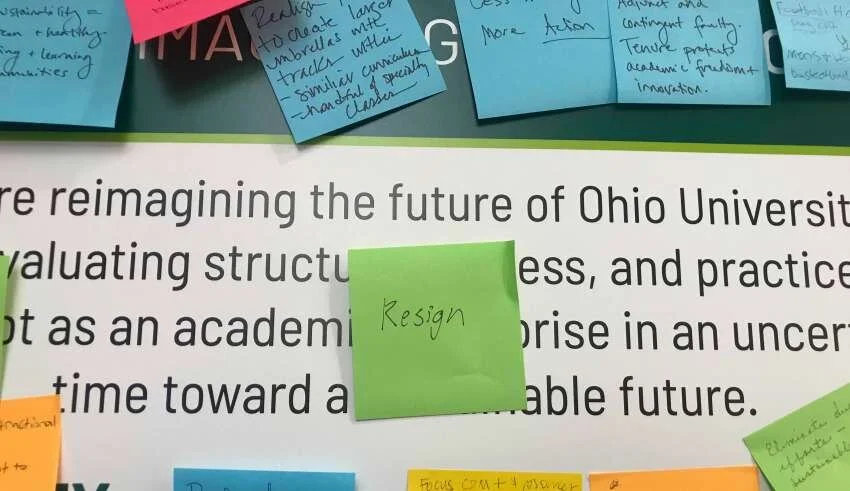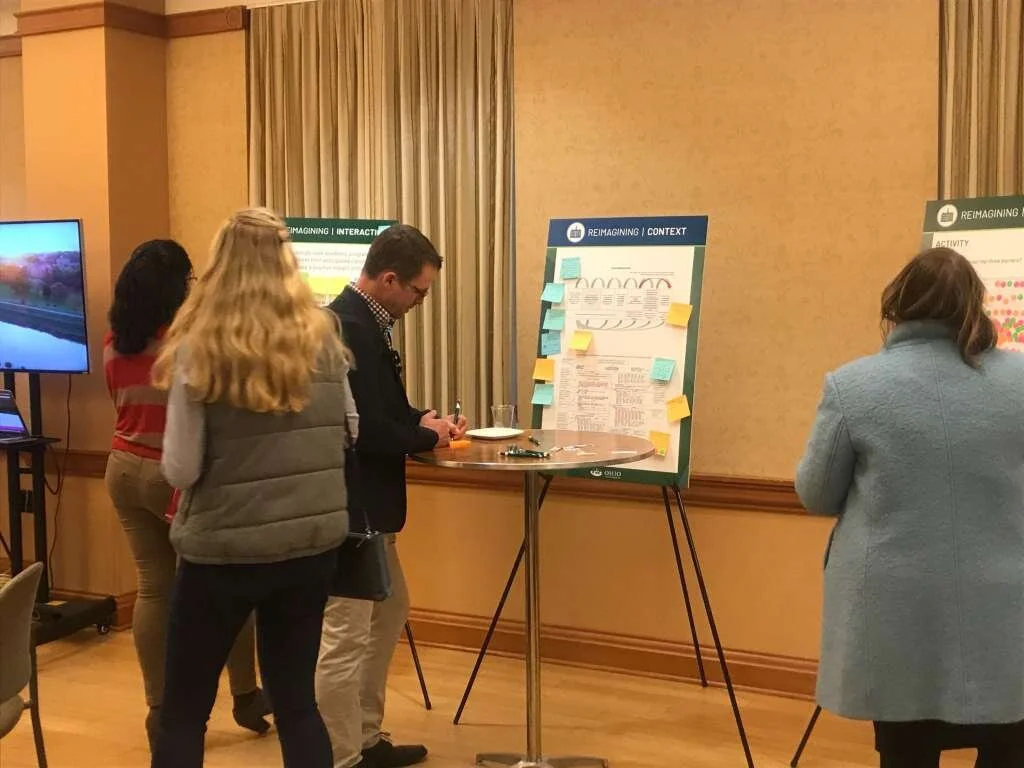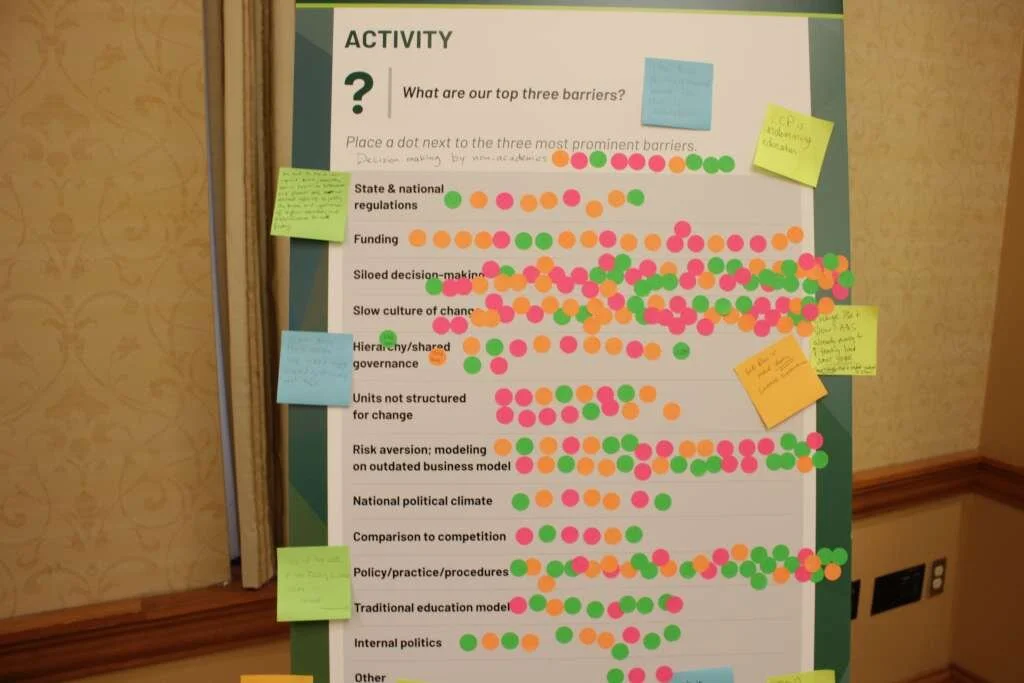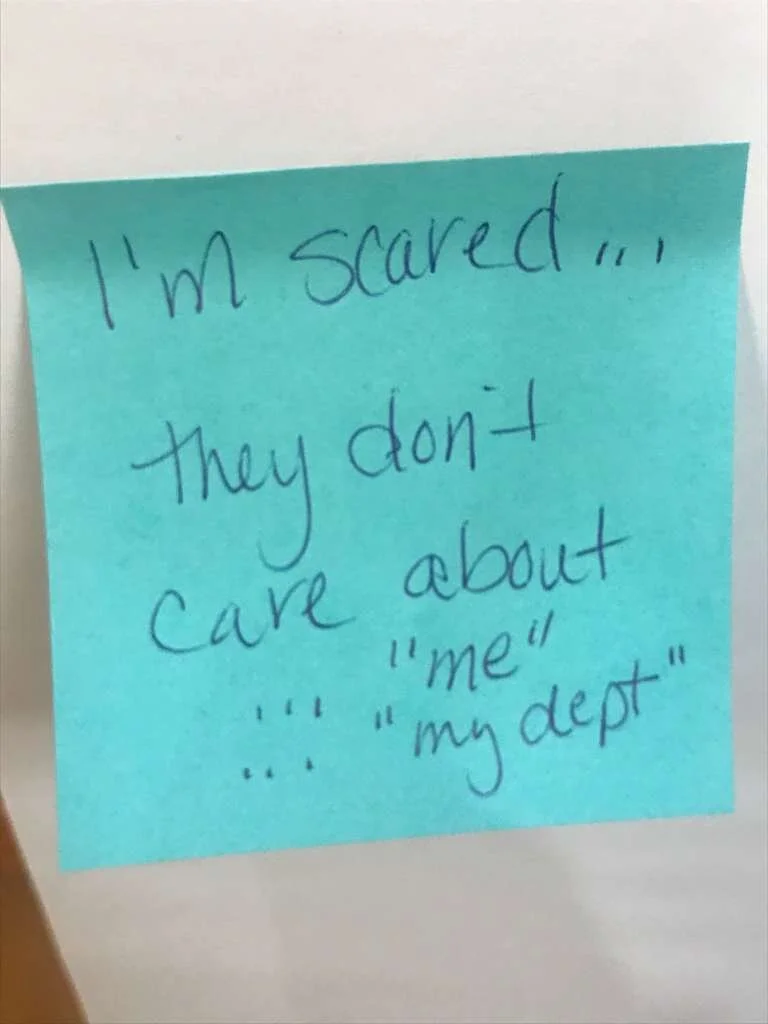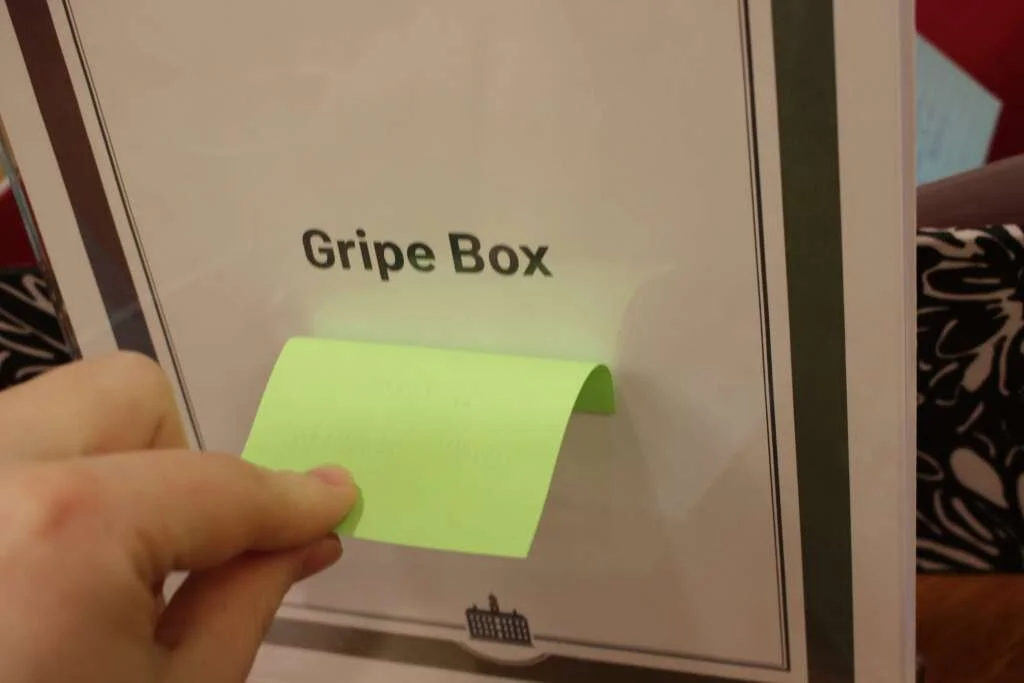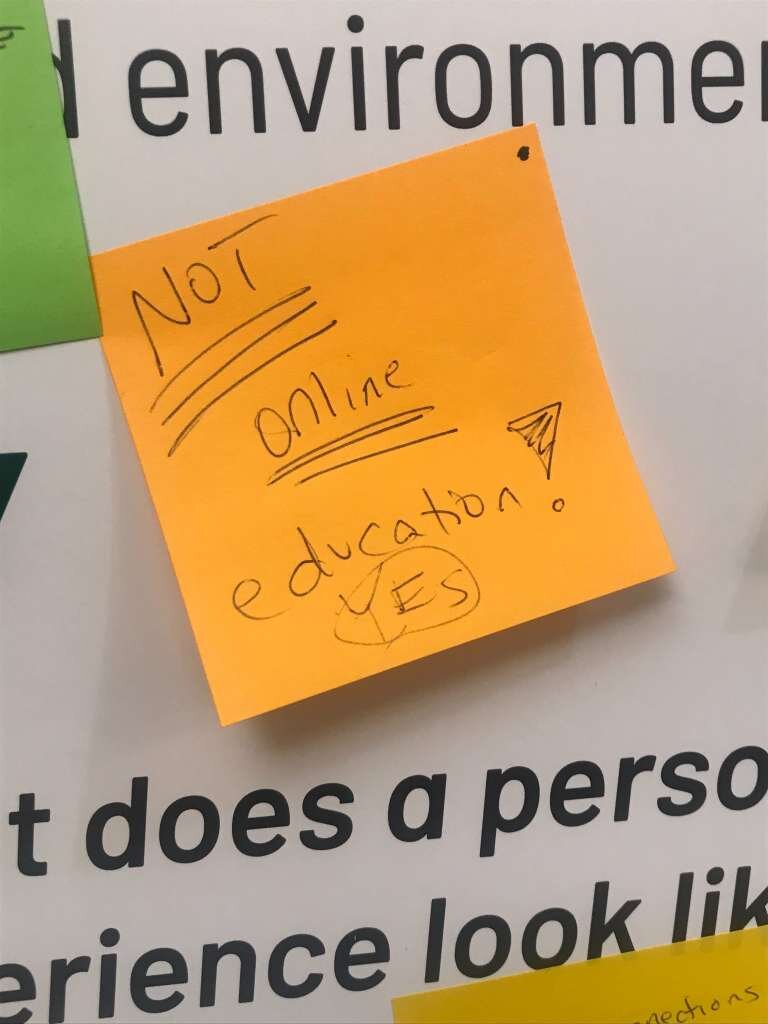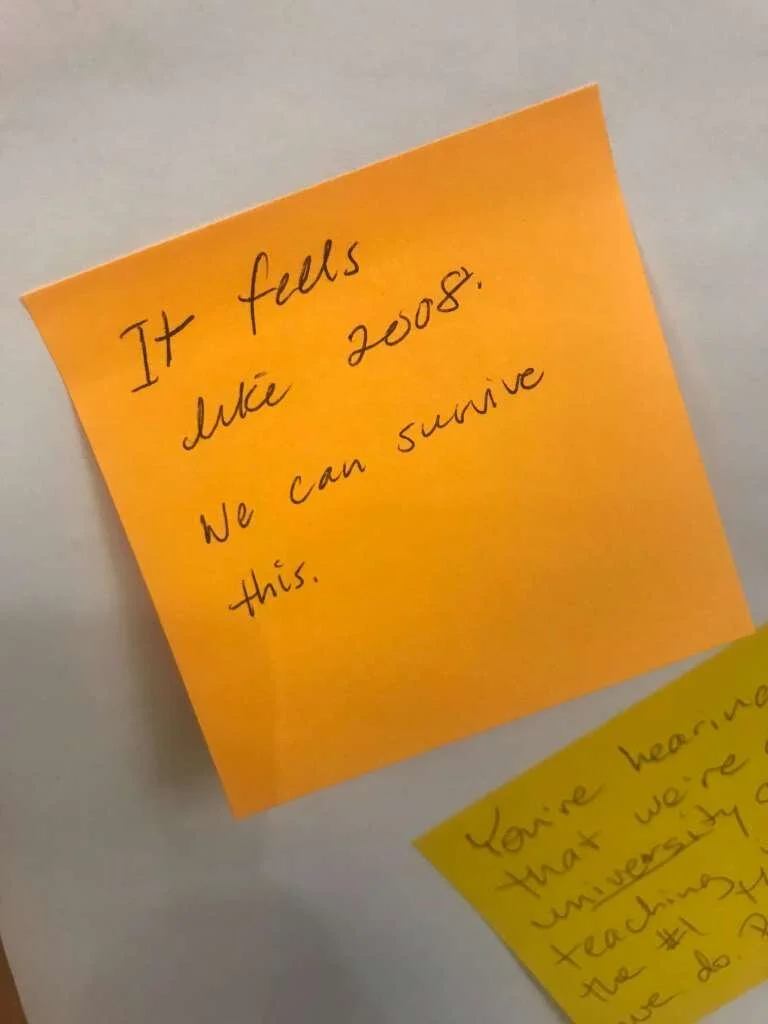Ohio U community express concerns at budget crisis forum
An anonymous note calls for resignations at the Reimagine OHIO event hosted at Baker Center. Photo by Tim Zelina.
"Reimagine Ohio", a forum seeking community insight on revamping Ohio U's budget crisis, gave participants a chance to offer their unfiltered perspectives.
Ohio University hosted a gathering of students, faculty, staff and community members on Thursday to offer insight into combating the university-wide budget crisis and modernizing educational services amid declining undergraduate student enrollment.
The forum — called “Reimagine OHIO” and held in a small conference room in Baker Center — ran from mid-morning to early evening and attracted hundreds of visitors. Several posters were hung across the room, posing questions that visitors were encouraged to answer by placing anonymous sticky notes on the posters. Tables situated in the room hosted sporadic group conversations on the budget crisis and educational program reform.
Ballooning expenses and declining enrollment have placed the university’s finances in a perilous position. Ohio U now needs to cut over $19 million in expenses, leading to fears of a ‘budget crunch’ that will wipe away vital academic services and faculty positions.
With growing community confusion and anger spurred by the massive budget shortfall, the administration developed Reimagine OHIO as a step toward developing a potential plan of action.
Laura Myers, deputy chief strategy and innovation officer at Ohio U, played a key role in organizing and executing the event.
“A lot of folks around the room seem like they’re lingering; they’re adding comments to the boards,” Myers said.
She expressed optimism about sourcing effective solutions from event attendees. Higher education is shifting rapidly, and Ohio U needs community input on how to adapt, she said.
“What do we do well? What should we stop doing? What should we be known for, be distinctive for?” she said.
Matthew Gehrett, an associate director at Ohio U’s Institutional Research Office, thought the event was a good step toward finding community consensus on addressing the crisis.
“We don't have a lot of forums in this university where people who are attending and running and working all are having a conversation in the same place, so I think it’s a really interesting model,” Gehrett said.
But the veneer of positivity put on by the event’s organizers did not seem to match the participants’ attitudes, as many admitted they were uncertain about the future.
“Unfortunately, people are scared, people don’t want to lose their jobs, I would like not to lose my job as well, but we can not lose sight of what our job is: to teach students,” Tobe Gillogly, chair of the Department of Interdisciplinary Health Studies, said.
None of the attendees employed by the university were willing to speak negatively about the administration, citing the risk to their employment. But with post-it note anonymity on their side, many attendees, staff, students and faculty wrote bitter condemnations of the administration’s role in the crisis concerning both quality of education at Ohio U’s and its ineffectual budget.
One poster asked participants to place neon stickers on the “top three barriers” to solving the campus’s problems. Overwhelmingly, stickers were placed on “siloed decision-making” and “slow culture of change.” “Policy/practice/procedures” and “risk aversion/modeling on outdated business model” also received a large proportion of the stickers.
The majority of the stickers were placed in categories that pointed the finger at the administration for the budget crisis, an attitude also reflected in many of the sticky notes stuck on posters.
A poster board asked participants what sort of messages people were gleaning from conversations that occurred during the event and notes placed on posters. Few answers were uplifting.
“Anger that this is happening, as it is a surprise,” one poster wrote.
“I’m looking for a job elsewhere,” wrote another.
“I’m scared. They don’t care about me, my department,” another read.
Faculty met last week for a forum on the budget crisis, where they expressed frustration at the administration’s perceived incompetence. That anger appeared to carry over to the Reimagine OHIO event.
Another poster board asked: “What radical changes would you be willing to see?” Some post-it note respondents proposed slashing the salaries and compensation of the administration and placing the administration on furlough. Referring to Ohio U President Duane Nellis, one said “Fire Nellis.” Another simply said, “Resign.”
Many notes took aim at the restrictions that bureaucracy imposed on graduate and research work that has fostered resentment by academics.
Under a board asking what the university can do to foster better community connections, one note said: “Let your researchers do research. The IRB doesn’t understand risk.” The IRB refers to the Institutional Review Board, which regulates Ohio U’s research programs.
Even a minor detail in the presentation of the event may have ruffled some feathers. A box was set on a table to collect anonymous complaints, with a post-it note stuck to it that read “legitimate concern box.” The post-it hid the original sign, which read “Gripe Box.”
While critiques of the administration dominated many of the poster boards, there were also prominent suggestions on how to revitalize Ohio U’s education model.
A few notes advocated extreme solutions, such as abolishing tenure or graduate programs, though other notes advocated against those proposals. One suggested streamlining and condensing majors, and another proposed the university offer more certificates and two-year degree programs.
Online courses, which are significantly more profitable for the university than classroom courses, received ire from participants. Online courses have been blamed for degrading the quality of Ohio U’s educational services.
One note read: “Online is not the answer! Why are we contracting with Pearson!?,” referring to the educational corporation.
Disillusionment with the administration is a common viewpoint among the staff and students who participated, based on the notes. But, for all the anger, fear and resentment, a determination to weather the storm shined throughout notes and conversations. A few even dismissed the “hysteria” triggered by the cuts.
“We’ve heard it all before — just another budget crunch fear cycle,” one note said.
But even some notes acknowledging the gravity of the situation saw a glimmer of hope:
“It feels like 2008. We can survive this.”

